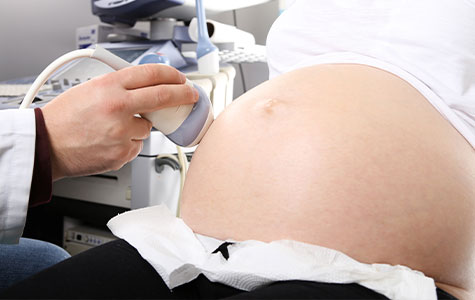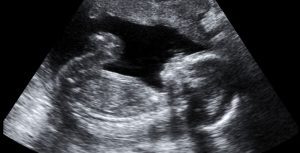

We’ve all had the unfortunate experience of hiccupping at an inopportune time. You’re in the middle of a presentation at work or on a first date, and suddenly you’re interrupted by an involuntary spasm that makes a very embarrassing noise.
But have you ever wondered why we get hiccups in the first place? It turns out that even babies in the womb can suffer from hiccups! Here’s everything you need to know about hiccups in the womb, including why they happen and whether they harm your developing baby.

Hiccups are caused by a sudden contraction of the diaphragm, the large muscle that separates the chest cavity from the abdomen. This contraction is usually triggered by eating or drinking too quickly or gulping air while chewing gum or smoking. Although we don’t fully understand why hiccups occur, we do know that they are involuntary and often stop on their own after a few minutes.
In babies, hiccups can be caused by anything that irritates the diaphragm, such as a full stomach, a sudden change in temperature, or even stress. In some cases, hiccups may also indicate an underlying medical condition, such as GERD (gastroesophageal reflux disease) or an infection.

Fetal hiccups are pretty common, and most pregnant women will experience them at some point during their pregnancy. They usually occur at the end of the second trimester and in the third trimester, as the baby grows larger and takes up more space in the womb.
NHS mentions fetal hiccups as a standard and expected occurrence in a healthy pregnancy. Most of the time, there is no need to worry about them, and they will go away on their own. Hiccups in the womb are perfectly normal! In fact, babies aren’t the only ones who hiccup in the womb: fetal sheep and fetal pigs have also been known to hiccup! Hiccups are thought to help babies practice breathing and swallowing. They also help to strengthen the muscles needed for these functions.
There are a few theories about why babies get hiccups while in the womb. We will go over some of them below.
One theory is that hiccups result from your baby’s swallowing reflex. This reflex is responsible for pushing amniotic fluid and anything else your baby has ingested back up into their throat. When your baby drinks, they suck the amniotic fluid and other liquids in their stomach back up into their esophagus. The spasmodic contraction of the diaphragm causes hiccups as your baby tries to swallow all of this fluid.
Another theory is that hiccups are a variant of the startle reflex. This reflex causes your baby to jerk or cringe when hearing a loud noise. It’s believed that the hiccups are caused by the same thing that causes the startle reflex: overstimulation of the nerves that control the diaphragm. When stimulated, they cause the diaphragm to contract, which results in a hiccup.
This theory posits that hiccups are a side effect of your baby’s rapid growth spurts. As your baby grows, its muscles and organs also have to grow and expand to accommodate its new size. It’s believed that during these growth spurts, the nerves that control the diaphragm can get stretched or irritated, which leads to hiccups.

For most women, fetal hiccups feel like gentle flutters in their bellies. Some women compare it to popcorn popping or a goldfish swimming around. Others say it feels like their baby is doing somersaults.
If you’re not sure if what you’re feeling are hiccups or something else, there are a few things you can look for. First, try to see if the movements are regular or sporadic. Hiccups tend to occur in cycles, so the motion should be rhythmic. Second, pay attention to the location of the movement. Hiccups will usually be felt in the lower half of your abdomen, near where your baby’s bottom is located.
If unsure, don’t hesitate to ask your doctor or midwife. They will be able to tell you if what you’re feeling are indeed hiccups.

There is no definitive answer to this question. In most cases, fetal hiccups will go away independently and don’t require any treatment.
If you’re finding the hiccups bothersome or seem to be affecting your baby’s movement patterns, there are a few things you can try. First, try to drink a glass of water or eat a small snack. Sometimes, hiccups can be caused by dehydration or hunger.
Another option is to try and relax. Stress can sometimes trigger hiccups, so try to take some deep breaths and focus on something calming. You could also try massaging your stomach or taking a warm bath.

Rest assured that fetal hiccups are usual and not harmful to your developing baby. In fact, some doctors believe that fetal hiccups may help the fetal lungs develop and mature.
Hiccups in the womb are being studied to see if there is a link between them and how well the baby does after birth. During a study in 2017, researchers interviewed 150 women who had stillbirths during the third trimester about their memories of fetal movement and hiccups. They compared these responses to those of 500 women who had live births or were still pregnant during that same period.
Robyn Horsager-Boehrer, M.D., a Chief of Obstetrics and Gynecology at UT Southwestern Medical Center’s William P. Clements Jr. University Hospital, comments on the results as follows:
—Approximately 80 percent of women in both groups remembered experiencing fetal hiccups – there was no significant difference between the responses of either group of women, suggesting that fetal hiccups are not associated with adverse pregnancy outcomes. The same was true when the data were adjusted by maternal age, body mass index, smoking, or whether the patient felt daily or prolonged hiccups.
Hiccups are generally not harmful to either the mother or the baby and usually resolve on their own within a few minutes. However, if the hiccups last for an extended period or become bothersome, you can always ask your doctor or midwife for advice.
Fetal hiccups are pretty common, and most pregnant women will experience them at some point during their pregnancy. While we don’t know for sure why babies get hiccups while in the womb, there are a few theories that attempt to explain this phenomenon.
Whatever the reason may be, one thing is for sure: hiccups can be very annoying—both for babies and their mothers! If the hiccups persist for an extended time or become bothersome, there are a few things you can try to stop them. Who knows, maybe one of these methods will even work for you! Don’t hesitate to comment on the question and tell our community how you stopped your baby’s hiccups.
If the hiccups persist, you can always ask your doctor or midwife for advice. They may be able to offer some additional tips on how to stop the hiccups.